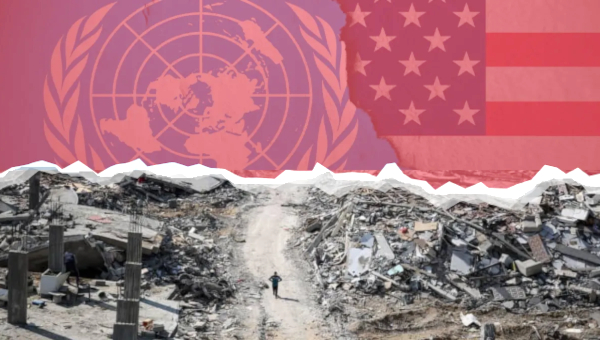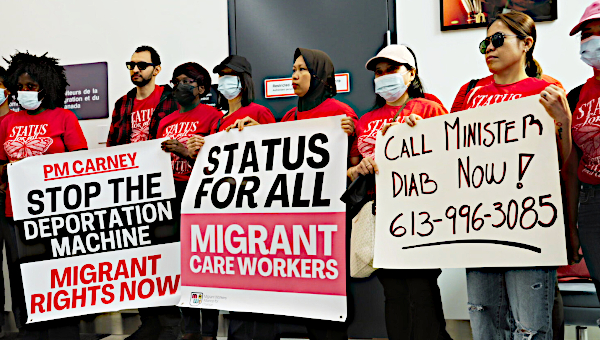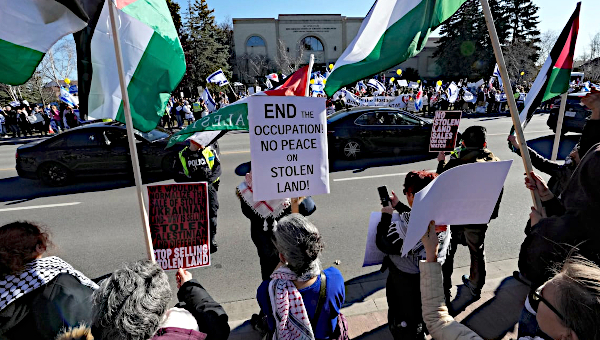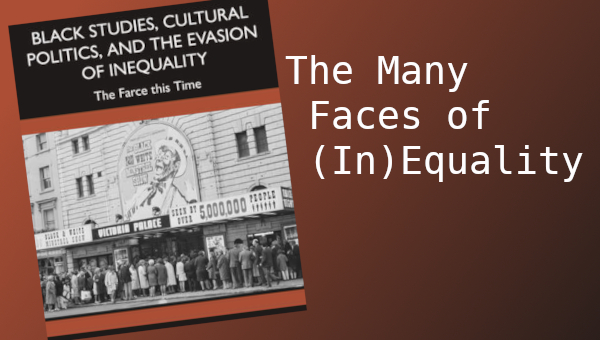Why I Chant “From the River to the Sea”
Supporters of Palestinian liberation have been chanting the slogan “From the River to the Sea, Palestine Will be Free” for many years. I myself, a Jewish advocate of human equality, have rallied enthusiastically to that motto for decades.
However, since October 7, 2023, defenders of Israel have taken to insisting that the slogan is antisemitic, that it is actually a call to massacre or obliterate Jews.
In fact, one MP has tabled a petition signed by 13,000 Canadians calling for the slogan to be classified as hate speech.
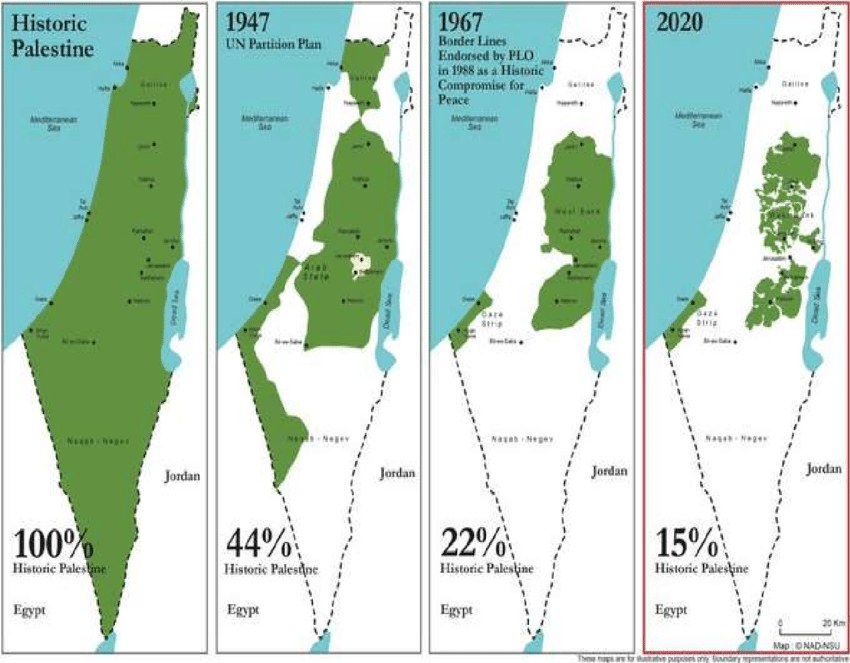
WTF?
There are two diametrically opposing ways to look at this accusation.
The first is to see the accusation as the ridiculous calumny it is. Surely the call for “freedom” is a simple appeal for equal civil rights for Jews and Palestinians in the State of Israel and in the occupied territories and in whatever political configuration those lands may take in the future.
Palestinians in the West Bank have been under constant persecution since the Six-Day War of 1967, with outright Israeli confiscation of land, arbitrary detention, torture, and daily humiliation, even murder at the hands of Israeli armed forces and fanatical settlers.
Gaza is subject to, at best, a suffocating blockade and land, air, and sea enclosure. At worst, it is subject to periodic genocide and starvation, as is presently the case.
And even within the State of Israel, 20% of its population are Palestinians – citizens of Israel who suffer from, as Human Rights Watch (which together with the Israeli B’Tselem and Amnesty International, have called “apartheid”) describes it:
“two tiered-citizenship structure and bifurcation of nationality and citizenship [that] result in Palestinian citizens having a status inferior to Jewish citizens by law. While Palestinians in Israel, unlike those in the OPT, have the right to vote and stand for Israeli elections, these rights do not empower them to overcome the institutional discrimination they face from the same Israeli government, including widespread restrictions on accessing land confiscated from them, home demolitions, and effective prohibitions on family reunification.”
So, the slogan “From the river to the sea…” can be considered as innocent as any poem, song, or slogan that promotes human rights. And the attempt to call it antisemitic is part of the well-orchestrated campaign by Israel’s avid supporters to render all criticism of Israel schtumm, silent, to alter the discourse, and to define out of existence our ability to even speak about Palestine and its people.
And the slogan seems exceedingly tame beside the chants of the followers of Israeli cabinet minister Itamar Ben-Gvir, reported recently by Israeli newspaper Ha’aretz thus:
“belting out racist songs and slogans in the heart of the Old City, including hits like ‘Shoafat is going up in flames’, ‘A Jew is a soul, an Arab is a son of a bitch’, ‘Death to Arabs’, ‘Mohammed is dead’, and ‘May their village burn’.”
More Sinister
But there is another way, a more sinister and cynical way of looking at “From the River.” Maybe the Israel supporters know something we don’t. Maybe they have a different way of defining the word “free.”
Let’s look at the Israeli national anthem “Hatikvah” (or “The Hope”). The original words were written in 1878 by Naftali Herz Imber, a Jewish poet born in what is now Ukraine, who emigrated to Ottoman Palestine. His words expressed a yearning for Jews to return to the land of Zion. When he recited Hatikvah for early Jewish settlers there, one of them set it to an old Rumanian tune and the rest, as they say, is history.
I learned the song as a child in my Talmud Torah, or Hebrew school, in Toronto in the 1950s. We sang it every day at the beginning of class. We also sang it at weddings and bar and bat mitzvahs.

There is a line in Hatikvah “Lihyot am chofshi beartzenu. Eretz Zion. Yerushalayim.” Translated into English it is: “To be a free people in our own land. The land of Zion, Jerusalem.”
So, was this line in Hatkvah mentioning the word “free” merely an appeal for equal rights for Jews in the Yishuv (the “Holy Land”)? Perhaps it was a call for equality and co-existence between Jews and Palestinians?
Not on your life. Over the years, history has proven what those words in Hatikvah really mean, at least to the Israeli leadership and their supporters. What “Lihyot am chofshi beartzenu” really means in practice is the active expulsion and dispossession, the ethnic cleansing, wherever and however possible, of Palestinians from their ancestral lands. It means the seizing of maximum territory with the minimum or no Palestinian population. From the Jordan River to the Mediterranean Sea.
Indeed, the name of the Israeli political party founded in 1948 by Irgun terrorist Menachem Begin was the Herut (“Freedom”) Party. Begin was elected Prime Minister in 1977. The Herut Party later morphed into the Likud Party, led by present Prime Minister Benjamin Netanyahu.
Thus, when Israel boosters hear the word “free,” they panic. They automatically refer in their minds to what the Hatikvah word “free” has come to mean in Israeli realpolitik, and they map their interpretation onto us.
Has anyone called out those words in Hatikvah for what they are? Nope.
Somehow, it’s perfectly okay for Jews to sing about freedom in the land and have people ignore what it really means. But when Palestinians and their allies express similar words, the slanderous accusation of antisemitism is hurled, and in some quarters, believed.
Supporting Freedom
A number of years ago, at a rally, a Palestinian organizer asked me to review his list of chants. I was flattered by the respect he showed me and glad to give advice. One of his chants was “From the River to the Sea, Palestine Will Be Free.” I told him that in my opinion, it was not antisemitic but that some ardent Israel fans were calling it that. He said, “Oh, I’ll leave that one out. I’ve got lots of others.”
At that time, I was content for him to leave that chant out. I believe that many of the things called antisemitic by Centre for Israel and Jewish Affairs (CIJA), B’nai Brith, and the Simon Wiesenthal Center are absolutely nothing of the kind. But sometimes it is politic to exercise some discretion and not be deliberately provocative. There are so many other effective ways to criticise Israeli policy and actions and support Palestine. Sometimes just pointing to the Israeli outrages is enough. More can be gilding the lily.
But things have changed. What things have changed? About 40,000 things. People, that is. The sheer scale of Israeli savagery in Gaza, not to mention the unspeakable depredations by settlers and Israeli forces in the West Bank, call for a sharpening of our language and a boosting of our rhetoric.
And precisely because the Israel shills viciously insist that the slogan “From the River to the Sea, Palestine Will Be Free” is antisemitic is good reason to push back and re-take the slogan, and proudly march to it. •


